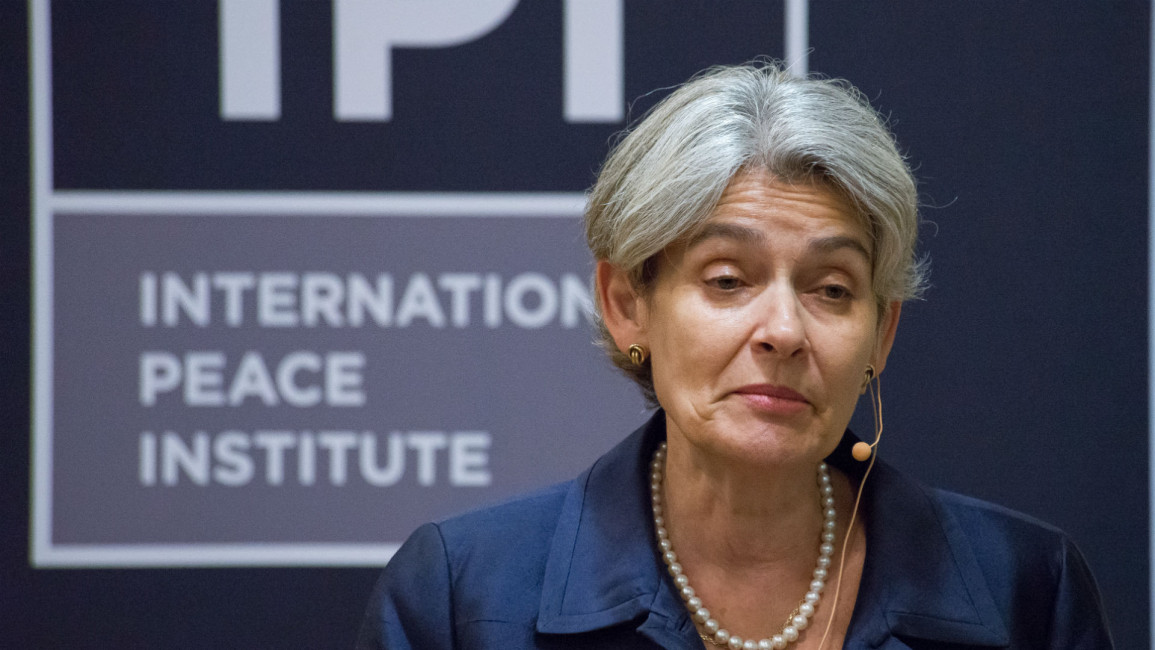Israel claims UNESCO chief faced 'death threats' over vote
The head of UNESCO received "death threats" after expressing reservations about Arab-backed resolutions on the holy sites in Jerusalem, Israel's ambassador to the UN organisation claimed on Monday.
Irina Bokova received the threats after her criticism of the two-state solution adopted last week at committee stage ahead of a final vote, Carmel Shama Cohen said on Israeli public radio.
Cohen went on to accuse Arab countries of "appalling conduct" over the drafts.
"The director general has received death threats and her protection has had to be reinforced," Cohen said.
But Bokova distanced herself from the resolutions in a statement, saying "nowhere more than in Jerusalem do Jewish, Christian and Muslim heritage and traditions share space".
The resolutions refer to "Occupied Palestine" and the need to "safeguard the Palestinian cultural heritage and the distinctive character of east Jerusalem".
They refer to the al-Aqsa mosque compound in occupied east Jerusalem's Old City - Islam's third holiest site - without any reference to the site also being revered by Jews as the Temple Mount.
On Friday, Israel suspended "all professional activities" with UNESCO over the draft decision which "deeply deplores" Israeli actions in Jerusalem and refers to the nation as an "occupying power".
The draft decision in question is Item 25: "Occupied Palestine", which was submitted by Egypt, Algeria, Morocco, Lebanon, Oman, Qatar, Sudan and Palestine.
According to the BBC, 24 members voted for the resolution at the committee stage, six voted against and 26 abstained.
The resolution only refers to al-Aqsa mosque by its Arabic name, a point of contention for the resolution's opponents, but also mentions the "importance of the Old City of Jerusalem and its Walls for the three monotheistic religions".
The text "deeply decries" continuous Israeli "aggressions" and the "forceful entering" of mosques in the region of the al-Aqsa mosque, one of Islam's most holy sites.
On the same day, the US States and the UN called for immediate action to salvage the two-state solution.
US Deputy Ambassador David Pressman told an informal council meeting on Israeli settlements that the continued building of Jewish outposts on Palestinian land was "corrosive to the cause of peace".
"We need to start implementing the two-state solution on the ground right now," Pressman told the meeting organized by Angola, Egypt, Malaysia, Senegal and Venezuela.
Pressman reiterated Washington's long-standing view that a final peace agreement must be negotiated between Israel and the Palestinians.
The two resolutions are due to be put to the executive board of UNESCO on Tuesday, but Michael Worbs, who chairs UNESCO's executive board, told AFP he hoped a final vote would be postponed to allow time for a compromise to be worked out.
The status of Jerusalem is the thorniest issue of the Israel-Palestinian conflict.
Israel captured east Jerusalem during the 1967 Middle East war and later annexed it in a move not recognised by the international community, declaring the entire city to be its indivisible capital.


![President Pezeshkian has denounced Israel's attacks on Lebanon [Getty]](/sites/default/files/styles/image_684x385/public/2173482924.jpeg?h=a5f2f23a&itok=q3evVtko)



 Follow the Middle East's top stories in English at The New Arab on Google News
Follow the Middle East's top stories in English at The New Arab on Google News


